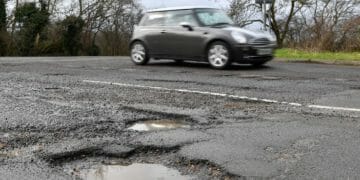
The number of empty homes in Eden has risen in the last decade, new census figures show.
Think tank the Institute for Public Policy Research said home shortages have increased rents and made home ownership unattainable. It urged the building of more houses to ensure everyone has access to a secure, warm and affordable home.
Census figures from the Office for National Statistics show 4,075 of 28,665 total dwellings in Eden were unoccupied on census day in March 2021.
It meant 14.2 per cent of the 28,665 total properties in the area were empty – up from nine per cent in 2011, when the last census was undertaken.
In England, the proportion of unoccupied dwellings has soared during the last decade, with 1.5 million (6.1 per cent) empty homes littered across the country – up from 4.2 per cent in 2011.
The census took place during the coronavirus pandemic, and the ONS expressed caution that some unoccupied dwelling figures may be inflated due to people living with parents, overseas residents returning home, and other lockdown-related restrictions such as travel.
Luke Murphy, associate director for energy, climate, housing and infrastructure at IPPR, said: “The shortage of homes is putting pressure on rents and pushing home ownership out of reach for many, so it’s concerning that the number of unoccupied homes rose in England and Wales over the past decade.
“Because the census took place during the pandemic, that may have contributed to the increase, but the rise means the Government should look again at policies to curb or control holiday homes, short-term lets, and empty homes.
“However, we mustn’t pretend this will solve the housing crisis. We must build millions more homes, including affordable housing, if we’re to ensure everyone has access to a secure, warm, and affordable home.”
The proportion of empty homes varied across the country – London had the most unoccupied dwellings at eight per cent, while the West Midlands (4.8 per cent) had the lowest.
London also saw the largest rise over the last decade, up from just 3.5 per cent in 2011.
In the North West 206,440 of 3,358,810 total houses (6.1 per cent) were empty.
Polly Neate, chief executive of housing and homelessness charity Shelter, said filling every empty property would not solve the shortage of affordable homes.
“If we can fill empty homes we should, but we will never solve the housing emergency without building a new generation of good quality social homes that local people can afford to live in,” Ms Neate added.
A spokesman for the Department for Levelling Up, Housing and Communities said local councils should be using existing powers to convert empty properties into homes.
They added: “They can increase council tax by up to 300 per cent on long-term empty properties, take over empty homes by Compulsory Purchase Orders and Empty Dwelling Management Orders, and convert commercial buildings to residential without the need for a full planning application.
“We have delivered over 2.2 million homes since 2010 and reduced the number of long-term empty homes by more than 30,000 over the same period. We are investing £11.5bn to deliver tens of thousands more affordable homes across the country.”






























